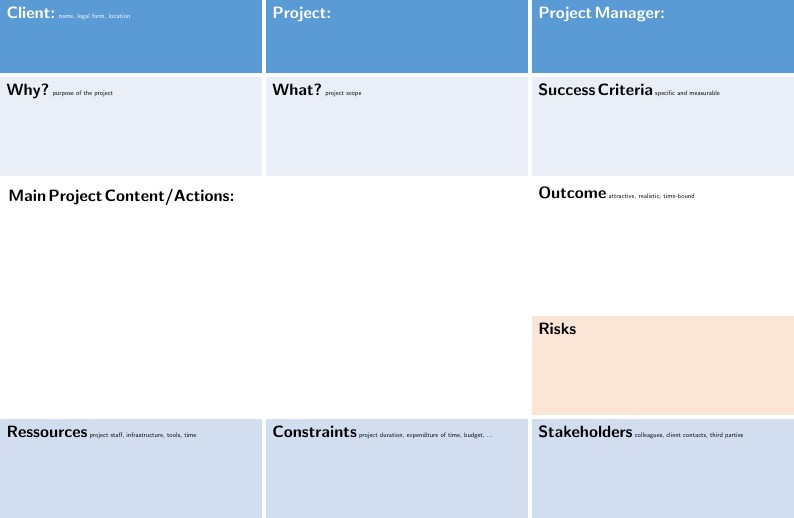
Simple project canvas. In order to use it, fill the empty custom nodes in the lower part of the template.

\documentclass[a4paper,landscape]{standalone}
\usepackage[utf8]{inputenc}
\usepackage{tikz}
\usetikzlibrary{positioning}
\title{Project Canvas}
% Colours
\definecolor{top}{RGB}{91,155,213}
\definecolor{bottom}{RGB}{210,222,239}
\definecolor{second}{RGB}{234,239,247}
\definecolor{risk}{RGB}{251,229,214}
% Styles
\tikzstyle{smallblock} = [execute at begin node=\setlength{\baselineskip}{2.5em}, text width=38em, node distance=.5em, minimum width= 40em, minimum height=10em, text depth=8em, text height=2.5em]
\tikzstyle{block} = [execute at begin node=\setlength{\baselineskip}{2.5em}, text width=38em, node distance=.5em, minimum width= 40em, minimum height=14em, text depth=12em, text height=2.5em]
\tikzstyle{bigblock} = [execute at begin node=\setlength{\baselineskip}{2.5em}, text width=38em, node distance=.5em, minimum width= 40em, minimum height=20em, text depth=17em, text height=2.5em]
\tikzstyle{megablock} = [execute at begin node=\setlength{\baselineskip}{3em}, text width=78em, node distance=.5em, minimum width= 80.5em, minimum height=34.5em, text depth=32.25em,text height=3em]
% Definitions
\newcommand\client[1]{\node[smallblock,fill=top,text=white,] (client) {\raggedright\Huge \textbf{Client:} \normalsize name, legal form, location \\[1em]\huge #1};}
\newcommand\project[1]{\node[smallblock,right= of client,fill=top,text=white,] (project) {\raggedright\Huge \textbf{Project:} \normalsize \\[1em]\huge #1};}
\newcommand\manager[1]{\node[smallblock,right= of project,fill=top,text=white,] (manager) {\raggedright\Huge \textbf{Project Manager:} \normalsize \\[1em]\huge #1};}
\newcommand\why[1]{\node[block,below= of client,fill=second] (why) {\raggedright\Huge \textbf{Why?} \normalsize purpose of the project \\[1em]\huge #1};}
\newcommand\what[1]{\node[block,right= of why,fill=second] (what) {\raggedright\Huge \textbf{What?} \normalsize project scope \\[1em]\huge #1};}
\newcommand\success[1]{\node[block,right= of what,fill=second] (success) {\raggedright\Huge \textbf{Success Criteria} \normalsize specific and measurable \\[1em]\huge #1};}
\newcommand\outcome[1]{\node[bigblock,below= of success] (outcome) {\raggedright\Huge \textbf{Outcome} \normalsize attractive, realistic, time-bound \\[1em]\huge #1};}
\newcommand\risks[1]{\node[block,below= of outcome,fill=risk] (risks) {\raggedright\Huge \textbf{Risks} \normalsize \\[1em]\huge #1};}
\newcommand\ressources[1]{\node[block,left= of constraints,fill=bottom] (ressources) {\raggedright\Huge \textbf{Ressources} \normalsize project staff, infrastructure, tools, time \\[1em]\huge #1};}
\newcommand\constraints[1]{\node[block,left= of stake,fill=bottom] (constraints) {\raggedright\Huge \textbf{Constraints} \normalsize project duration, expenditure of time, budget, ... \\[1em]\huge #1};}
\newcommand\stake[1]{\node[block,below= of risks,fill=bottom] (stake) {\raggedright\Huge \textbf{Stakeholders} \normalsize colleagues, client contacts, third parties \\[1em]\huge #1};}
\newcommand\content[1]{\node[megablock,below= of why.south east, xshift=.25em] (content) {\raggedright\Huge \textbf{Main Project Content/Actions:}\\[1em]\huge #1};}
\begin{document}
\sffamily
%%%%%%%%%%%%%%%%%%%%%%%%%%%%%
%% START YOUR ENTRIES HERE %%
%%%%%%%%%%%%%%%%%%%%%%%%%%%%%
\begin{tikzpicture}
% Basic informationen
\client{}
\project{}
\manager{}
% Project information
\why{}
\what{}
\success{}
\outcome{}
% Project context
\risks{}
\stake{}
\constraints{}
\ressources{}
% Project content
\content{}
\end{tikzpicture}
\end{document}